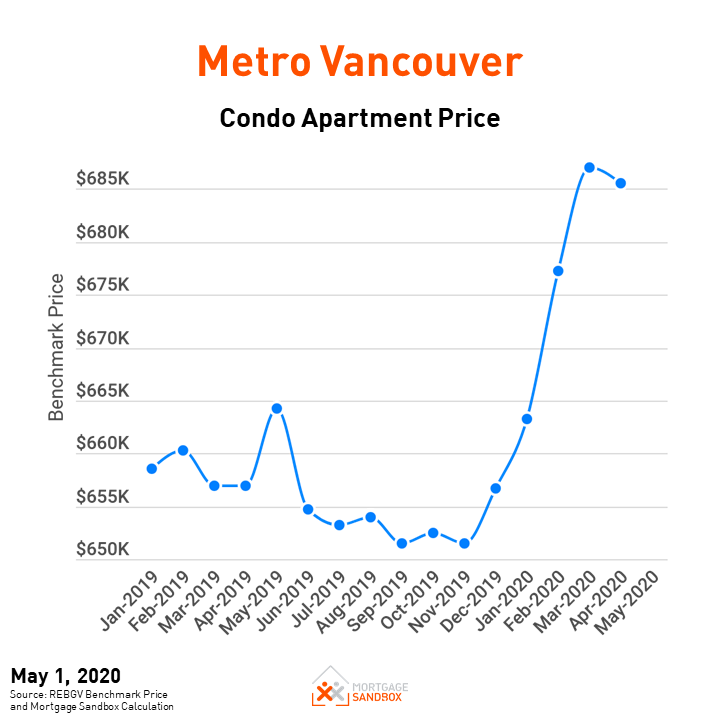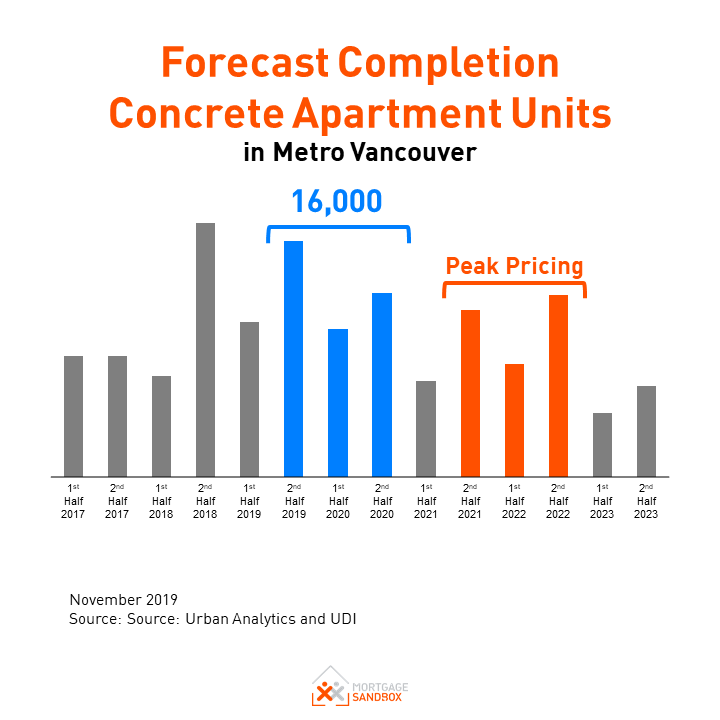Metro Vancouver Home Price Forecast
HIGHLIGHTS
|
This article covers:
Where are Metro Vancouver prices headed?
What factors drive the price forecast?
Should investors sell?
Is this a good time to buy?
1. Where are Metro Vancouver prices headed?
Home Price Overview
Unfortunately for home buyers, the benchmark prices of homes have accelerated significantly in the past few months. However, the median price of homes sold has been dropping significantly in most major sub-markets and this is a leading indicator that prices will fall. Here is a sampling of median house price changes between March and April 2020:
Westside Vancouver: ▼ $245,000
North Vancouver: ▼ $120,000
Richmond: ▼ $120,000
Burnaby: ▼ $85,000
East Vancouver: ▲ $5,000
Central Surrey: ▲ $5,000
Given the Coronavirus Recession, sellers may want to push ahead and sell during the pandemic. There is no guarantee that home prices will regain the current highs any time soon because a Coronavirus induced recession may inflict long-term economic damage.
Coronavirus is now the primary source of uncertainty for home values.
Metro Vancouver Detached House Prices
House price growth in Greater Vancouver was accelerating in early 2020. The “soft landing” that government policymakers were targeting had become more elusive. We believe politicians were hoping to guide the market toward a typical seasonal real estate cycle with price growth in the range of 1 to 3% annually – in line with income growth.
Although the benchmark house price for Greater Vancouver has been rising, the median price of houses sold has been dropping significantly and this is a leading indicator that prices will fall. There is currently an over-supply of houses priced over $2 million.
Metro Vancouver Condo Apartment Prices
Metro Vancouver apartment prices peaked in June of 2018. Although they were on their way back up in early 2020, they hadn’t yet reached the previous highs when the Coronavirus Recession began pulling prices down again.
The benchmark Metro Vancouver condo is still not affordable without help from family.
Entering the Coronavirus Recession, there was an oversupply of luxury condos for sale. Over time, the more expensive, higher quality, and larger (i.e., 2 and 3 bedrooms) apartments will drop in price, and this will depress the values downward for more modest condos.
At Mortgage Sandbox, we would like to see developers building more 4 and 5 bedroom condos. Not everyone can afford to put their family in a house, and for many parents, work-related travel makes it difficult to stay on top of basic upkeep (i.e., mowing lawns, clearing eaves, shovelling sidewalks).
Still a challenge for first-time homebuyers
Although Vancouver home prices have dropped significantly, they are still not very affordable. A first-time homebuyer household earning $75,000 (the median Metro Vancouver household before-tax income) can only get a $300,000 mortgage. To buy a benchmark priced $680,000 condo, a first-time homebuyer needs to save $380,000 cash for a down payment or receive a very generous gift from mom and dad. For most people, that’s just not on the cards.
What about the rest of BC?
Read the Victoria Real Estate Forecast and Okanagan Real Estate Forecast.
2021 Metro Vancouver House Price Forecast
At the beginning of 2019, RE/MAX optimistically predicted house prices in Metro Vancouver would drop only 3% while Central 1 (the Economists supporting Credit unions) predicted a drop of 7%. In the end, a benchmark Metro Vancouver house price dropped 3.8% in 2019. Generally, more expensive areas performed more poorly than areas that provide better value.
For 2020, the average of the forecasts used in our analysis predicted a modest rise of 2% each of the next two years. CMHC provides a range and their best-case scenario results in a price rise of 8% in 2020, but their pessimistic scenario anticipated prices drop 2%.
Our forecast adjustment for COVID-19
None of our primary forecast sources have issued revised forecasts that incorporate the impact of a Coronavirus Recession, so we have adjusted the range of projections based on a rule of thumb provided by Moody’s Analytics. Moody’s Analytics specializes in products to help banks analyze loan and mortgage risks.
In a recent interview, Brendan LaCerda, a Senior Economist with Moody’s Analytics, estimates that each 1% rise in unemployment results in a 4% drop in home prices. Using this ratio, if Canadian unemployment reaches a sustained 11% (a 5% increase), then home prices could drop by 20%.
We have taken a conservative approach and adjusted the 2020 forecasts down by 10% (a prolonged 2.5% rise in unemployment) for the optimistic scenario and down 20% for the pessimistic scenario (an extended 5% rise in unemployment).
How realistic are these unemployment forecasts? On April 9th, the Canadian Parliamentary Budget Officer (PBO) projects Canadian unemployment will reach 15% by June 2020, and that stay as high as 13% by the end of the year.
The PBO may be underestimating the levels of unemployment.
The U.S. Fed projects unemployment in the United States is likely to reach a peak of 30%.
A recent research paper by Alex Bick, “Real Time Labor Market Estimates During the 2020 Coronavirus Outbreak” estimates that U.S. unemployment has already reached 20% and 21% of those who still have their jobs report a decline in earnings.
Joseph Brusuelas, the Chief Economist at audit firm RSM believes the U.S. is almost certainly facing a 20% unemployment rate now.
For a more thorough comparison of the Coronavirus Recession to the Great Recession and the Great Depression and their impacts on property prices, check out our recent article: “Should I sell my home today?”
At Mortgage Sandbox, we provide a price range rather than attempting a single prediction because several risks can impact property prices. Risks are events that may or may not happen. As a result, we review a variety of forecasts from leading lenders and real estate firms, and we then present the most optimistic estimates, the most pessimistic prediction, and the average forecast. Want to learn more about real estate risk? We've written a comprehensive report that explains the level of uncertainty in the Canadian real estate market.
Our forecast inputs:
2. What factors drive the price forecast?
Mortgage Sandbox 5 Factor Framework
At the highest level, supply and demand set house prices and all other factors simply drive supply or demand. At Mortgage Sandbox, we have created a five-factor framework for gathering information and performing our market analysis. The five key factors are affordability, capital flows, government policy, supply, and popular sentiment.
Affordability
Affordability is a function of:
Home Price Changes: Changes in the market value of the desired home.
Savings-Equity: How much disposable after-tax income you’ve been able to squirrel away plus any equity you have in your existing home.
Financing: Your maximum mortgage is calculated using income (i.e., how much money you can put toward mortgage payments) and interest rates (how big are the mortgage payments).
Increased affordability raises buyer purchasing capacity and puts upward pressure on prices while dropping affordability has the opposite effect.
How have these changed lately?
Home Price Changes
Price growth reduces affordability and creates downward pressure on prices. Home ownership costs are considered unaffordable when they exceed 40% of household income.
In March 2020, Vancouver home ownership costs were 80% of the median household income. In other words, Vancouver home prices had exceeded economic fundamentals before the impact of the Coronavirus.
Savings-Equity
Rents were rising faster than incomes, so first-time buyers struggled to come up with down payments. To add insult to injury, anyone who managed to save a down payment and invested it in ‘blue chip stocks’ may now find out they’ll need to save for a few more years.
Existing homeowners benefited from price appreciation, so they had more home equity to use when buying a bigger home. That price gain may be short-lived as the economic impact of Coronavirus is likely to depress prices trapping people in their ‘starter home’ until prices recover.
With the Coronavirus containment efforts, the banning of evictions, the conversion of Airbnbs into long-term rentals, and a halt to immigration, we believe rents will drop. That will allow renters to save more toward a future purchase when the market thaws.
Financing
Median Vancouver incomes have not changed materially, but employment levels are dropping.
A U.S. Federal Reserve economist predicts unemployment in the United States could reach over 30%. Canadian unemployment was roughly 6% at the beginning of 2020, and according to an April 21st article in Maclean’s Magazine, Canada’s unemployment rate rose to 22 percent. Apart from layoffs, many salaried employees who have not been laid-off have been asked to take pay cuts.
To mitigate the impact of job losses, the Bank of Canada has reduced its ‘Target Rate’ dramatically, but mortgage qualifying interest rates have not fallen nearly as much.
Job losses from Coronavirus containment efforts are a more powerful force than low mortgage rates because without income you can not qualify for a mortgage.
Overall Affordability
The Coronavirus Recession will reduce housing affordability in the already unaffordable Vancouver market because many people will lose their jobs, close their businesses, or accept pay cuts.
Even before Coronavirus, a household earning $75,000 (the median Metro Vancouver household before-tax income) could only get a $300,000 mortgage and that doesn’t buy much in Metro Vancouver.
Capital Flows
These represent short-term investment, long-term investment, and recreational demand (i.e., homes not occupied full-time by the owner). Here is where foreign capital, real estate flippers, and dark money come into play. It also includes short-term rentals, long-term rentals, and recreational property purchases.
Capital inflows raise demand and put upward pressure on prices while capital outflows have the opposite effect. If capital sits invested in real estate nothing is bought or sold, it has no effect on the direction of prices.
Foreign Capital
Foreign Capital inflows were already dropping due to a combination of taxes and the ownership registry:
The annual B.C. speculation and vacancy tax rate is 2% for foreign owners and satellite families.
Since some foreign buyers were circumventing the tax using Canadian shell companies and straw buyers, the BC government will launch its corporate beneficial ownership registry in May of 2020.
Now with the travel bans that are part of Coronavirus containment efforts, we can expect there will be very little foreign investment in Canadian real estate.
Long-term Rentals
Rental investments are a significant driver of home prices. As it relates to our analysis, we expect domestic interest in long-term rental income properties will dry up so long as Coronavirus eviction bans are in place. The government has not developed an exit strategy for landlords with rent arrears for when social isolation policies are lifted. How will tenants repay three to six months of rent arrears?
Rental investors will simply try to time any future property purchases for the end of Coronavirus containment period, and they will avoid properties with tenants who have outstanding rent arrears.
Short-term Rentals
We are watching short-term rentals closely because travel bans will effectively shut down short-term rentals for the next few months (Canada’s tourist high season).
No one will be buying real estate for short-term rentals until travel restrictions are lifted.
House Flippers
With Coronavirus containment efforts underway, house flipping will be very risky so we expect serial flippers will stay out of the market until they see a bottom to the market.
It may be 6 months to a year before the market finds bottom and the flippers emerge to pick up some bargains.
Dark Money
Dark money is proceeds of crime or money that is transferred to Canada illegally. This includes money earned legitimately that is illegally transferred from countries with capital controls (e.g., China) and legitimate earnings moved from countries who are the subject of international sanctions (e.g., Iran, Russia, and North Korea).
In order to hide the illegal nature of the funds, it is laundered in the real estate market. Sometimes the true owner of the property is hidden by using property is bought by a Straw Buyer and other times the property is owned by a shell company.
Sometimes a real estate agent or lawyer will accept the illegal cash to help the nefarious individuals hide its true origins. In 2015, a B.C. realtor was caught with hundreds of thousands of dollars in her closet, at home.
$5 billion in illicit cash was laundered through real estate in 2018, and approximately three percent of straw buyers were students, homemakers or unemployed.
An eye-opening report by Royal LePage says that Canadian residents on student visas buy 1 out of 10 homes in B.C. It would appear that the parents of students are using their children to evade the Foreign Buyer Tax.
The beneficial ownership registry may reduce the number of student purchasers if their parents, who are foreign residents, are identified as the ultimate beneficial owners.
We see no evidence of a diminished role for dark money in local real estate.
Overall Capital Flows
The net effect of all the recent changes to Capital Flows will be to reduce inflows of capital toward residential real estate, and this will put downward pressure on home prices.
Government Policy
Governments were trying to engineer a ‘soft landing’, but now they are trying to protect against a housing crash by encouraging banks to allow borrowers to defer their mortgage payments up to six months.
COVID-19 Support Measures
Mortgage Payment Deferral
A typical mortgage deferral is an agreement between the borrower and the lender to pause or suspend mortgage payments for one or two months. For the Coronavirus, they have extended this for up to 6 months.
After the agreement ends, your mortgage payments return to normal. The mortgage payment deferral does not cancel, erase, or eliminate the amount owed on your mortgage. The borrower still accrues interest that will have to be paid.
A Canadian with a $250,000 mortgage who defers their mortgage by six months adds approximately $4,000 in accrued interest to their mortgage balance.
Eviction Bans and Suspensions
The B.C. government has suspended the enforcement of evictions indefinitely and Residential Tenancy Branch will not issue any new eviction orders until further notice. Sheriff's offices have been asked to postpone any scheduled enforcement of eviction orders.
Short-term Rental Regulation
A recent court decision upheld a strata corporation’s restrictions on short-term rentals. In the case, the condo owner was ordered by a B.C. Civil Resolution Tribunal to pay $46,400 in fines.
Speculation and Vacancy Tax
At the end of 2019, the annual Speculation and Vacancy Tax rate on foreigners quadrupled from 0.5% to 2.0%
Beneficial Ownership Registry
BC’s Corporate Beneficial Ownership Registry comes into effect in May of 2020. This may help to reduce dark money in B.C. real estate.
Supply
Supply comes from two sources.
Existing sales: Existing home sales are sales of ‘used homes’. They are homes owned by individuals who sell them to upgrade, to move for work, or some other reason. The Real Estate Board of Greater Vancouver only reports existing home sales and listings.
Pre-Sales and Construction Completions: Most new homes are sold via pre-sales before the construction has started. These are predominantly apartments and townhomes. Data on pre-sales is private and difficult to find, but construction starts (reported by the government) are a very accurate lagging indicator of pre-sale activity.
Rising supply releases the upward pressure on prices caused by demand.
Months of Supply of Existing Homes
The B.C. Real Estate Association has cancelled all open houses to comply with the pandemic containment laws and Spring is typically the busy season for real estate activity. This year, it will be more challenging to buy homes during a pandemic so only motivated sellers will sell. At the same time, a majority of willing buyers will be sidelined by employment and savings concerns.
In the past, a lack of active listings was driving the seller’s market. Today, a lack of demand has shifted the market in favour of buyers.
Coronavirus mortality rates (short-term impact)
We know that older Canadians are more vulnerable, and the fatality rates follow a pretty clear trend:
People aged 80 and up have an expected 14.8 percent mortality rate
8 percent of those 70 to 79 succumb to it
3.5 percent of 60 to 69 year-olds are likely to pass away
In 2020, 45% of baby boomers will be over 65 years old, and in Metro Vancouver, roughly 16% of the population is over 65 years old, but in Nanaimo, Victoria, and Kelowna, more than 20% of residents are in their golden years. In White Rock, 25% of residents are vulnerable to COVID-19.
Obesity is also a COVID-19 risk factor and 22% of B.C. residents are obese.
The Coronavirus could cause an unusually large number of homes to come to market in areas favoured by retirees. Real estate prices in these areas may be particularly vulnerable.
Coronavirus short-term rentals sold or converted (short-term impact)
Travel bans will effectively shut down short-term rentals for the next few months (Canada’s tourist high season). The drop in bookings may force many owners of apartments primarily used as short-term rentals to sell their condo or repurpose it for long-term rentals adding up to 3,500 homes to the market in the next six months.
We surveyed over 50 Canadian real estate agents and 50% had observed a majority of short-term rentals being listed as long-term furnished apartment rentals and 25% expected Airbnbs owners would sell their homes to cash in the capital gains.
Mortgage Delinquencies and Foreclosures
The most recent data indicates that more Canadians are missing their monthly payments, and job growth has been healthy. Some economists have been warning of a recession, and even without a recession, it appears more Canadians are over-extending themselves. Surprisingly, the increases in delinquencies are led by Ontario and British Columbia, and not Alberta.
According to Equifax, the credit bureau company:
“Mortgage delinquencies have also been on the rise. The 90-day-plus delinquency rate for mortgages rose to 0.18 percent, an increase of 6.7 percent from last year. Ontario (17.6%) led the increases in mortgage delinquency followed by British Columbia (15.6%) and Alberta (14.8%). The most recent rise in mortgage delinquency extends the streak to four straight quarters.”
A recent survey by MNP reported a staggering number of Canadians are stretched to their limits:
“Over 30 per cent of Canadians say they’re concerned that rising interest rates could push them close to bankruptcy, according to a nationwide survey conducted by Ipsos on behalf of MNP, one of the largest personal insolvency practices in the country.”
Job losses from Coronavirus containment will worsen this situation. Although the CMHC can help Canadians via Canadian lenders offers options to defer payments, re-amortize mortgages, add interest arrears to your mortgage balances. It will not help overextended Canadians from their credit card debt nor will it protect Canadians who chose to finance their homes with private mortgage lenders. Antrim, one of the larger private lenders in B.C. has lent $500 million in British Columbia. 1,529 of their mortgages are in Metro Vancouver with an average weighted interest rate of 8%. Most of their mortgages need to be re-approved every 12 months.
Baby Boomers Right-sizing?
According to a recent survey, 26 percent of B.C. Boomers who own a home had most of their retirement savings tied up in real estate. Another survey from RBC says, “Over the coming decade, we expect baby boomers to ‘release’ half a million homes they currently own—the result of the natural shrinking of their ranks, and their shift to rental forms of housing, such as seniors’ homes, for health or lifestyle reasons.”
We prefer the term '‘right-sizing’ because most boomers selling a house are buying luxury apartments with large floor plans in buildings with shared pools, saunas, gyms, and party rooms. That hardly sounds like a step down.
As baby boomers begin right-sizing and list their million-dollar homes for sale, they will add supply in what is considered the luxury market. If not enough Gen-X and millennial buyers are to buy these expensive homes, there is a risk that this may depress prices at the top of the market, which will then compress prices for townhomes and condo apartments.
In the near-term, supply is tight, but in the medium-term, there are risks of excess housing supply.
Pre-sales and Completions
New Construction
There is a record number of homes under construction and many are nearing completion. As these buildings complete in 2020 and 2021, and people move out of their rental or sell their current home, this new supply should alleviate some of the pressure in the market.
As well, units completing in late 2021 were sold at peak prices before the recent price correction. These “peak price” condos will be very difficult to flip at a profit and buyers taking possession will have difficulty obtaining mortgages when if the market value turns out to be lower than the purchase price. As a result, peak priced condos may be re-released to the market but with tight sales timelines.
Pre-sales
Pre-sales, which are purchases of brand-new homes from developers, are measured using housing starts. Developers need to sell at least 70% of a project to secure financing and begin construction and that’s why construction starts are a good indicator success pre-selling new developments.
Pre-sales will trend down as showrooms close during the pandemic. When social distancing measures are lifted developers will likely try to entice buyers with price discounts, move-in allowances, and cool amenities.
Popular Sentiment
Wait-and-See Strategy: There's no way of predicting popular sentiment, but as witnessed in the past two years, sentiment can shift quickly.
Nanos Canadian Confidence Index showed a noticeable drop in confidence mid-March, before a state of emergency was announced. Future index announcements will likely be worse.
3. Should Investors Sell?
From a seller’s perspective, there are more changes in the market that influence prices downward so now may be a better time to sell than in two years and the seasonal real estate cycle usually favours sellers in the first half of the year.
With Coronavirus containment efforts, open houses may be impossible. However, you can get a Realtor to help you plan small repairs and improvements to your home so that it will be ready when the real estate market thaws.
Sellers should always consult a mortgage broker early to prioritize flexible loan conditions and reduce the risk of mortgage cancellation penalties. Find out more about the benefits of a mortgage broker.
4. Is this a good time to buy?
Homebuyers who waited now benefit from lower interest rates and prices that are unchanged from a year ago. They can now get a larger mortgage and buy more house with their larger buying budget.
Coronavirus containment efforts may make it difficult visit a bank or view homes. However, if you are considering a purchase, you can get a mortgage pre-approval from a mortgage broker and ask a Realtor to monitor the market, all without leaving your home. Then you’ll be ready when the ‘fog clears’.
Looking forward to 2021, prices are unlikely to rise dramatically so buyers shouldn’t feel the need to rush to an offer. Also, keep in mind that the seasonal real estate cycle usually favours buyers in late summer.
If you are thinking of buying just be sure to drive a hard bargain and cover your bases with smart and educated decisions. Don’t bite off more than you can chew.
Buying a home is a big decision, so check out Mortgage Sandbox’s Canadian Homebuyer Guide so we can walk you through the end-to-end process and get you ready to buy your new home!
Here are some recent headlines you might be interested in:
For B.C. real estate, will COVID-19 bring down the house? (BC Business, Apr 23)
Virus-driven rate cut could add kerosene to housing market (BNN Bloomberg, Mar 3)
Canada must expose hidden company owners to end 'snow washing,' inquiry hears (CTV, Feb 26)
Assessing whether 2020 will bring a Canadian property tumble (CBC, Dec 19)
Like this report? Like us on Facebook.

















